

It was January 2, 2021, a week prior to the Chinese Lunar New Year. The COVID-19 pandemic has not dampened people’s enthusiasm for the once-a-year family gathering, but for 39-year-old Wang Lihua, this could be her sixth New Year of not coming home.
Toiling herself indefatigably on the frontline against COVID-19 pandemic for months, Wang, a nurse at Beijing Fangzhuang Community Health Service Center, is one of the tens of thousands of medical workers in Beijing whose daily routine is to collect COVID-19 test samples. According to statistics, as of January 24, Wang and her colleagues have completed over 17 million COVID-19 tests, with an average daily workload of 415,680 tests and the highest daily record of 1.4 million tests.
7:00 a.m. The only sound in her office was the soft tick of the clock. Feeling hesitant to call her parents to tell them her decision to not come home, Wang put down her mobile phone and started preparation for today’s sample collection. Work keeps her busy, and work might be the only way to temporarily forget the guilt she feels for her family.
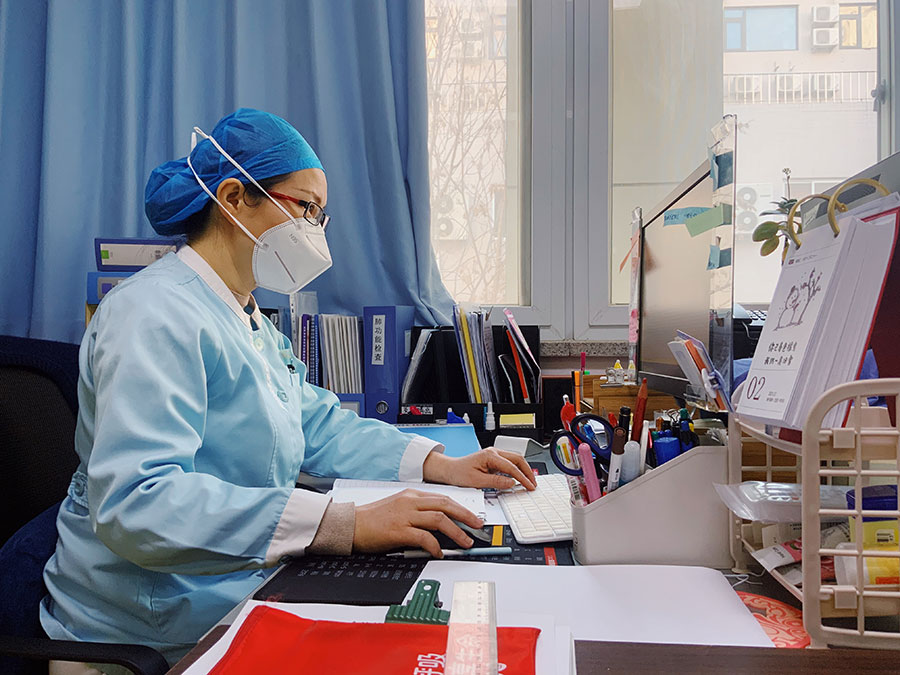
7:20 – 7:50 a.m. Verification of information (People’s Daily Online/Kou Jie)
Wang’s office hours start at 8:00 a.m., but she came to the office an hour earlier to double-check the patients’ information and prepare necessary equipment.
“The job of collecting COVID-19 test samples is quite complicated. We need to verify and register the patients personal information, communicate with the patients and their family, as well as collect samples and send samples back to the labs. We must be very careful, careless actions may result in severe consequences,” said Wang.
During the COVID-19 pandemic, Wang’s daily work is divided into two parts: indoor sample collection in the morning and outdoor nucleic acid tests in the afternoon..
“For those who are in quarantine, we will take necessary equipment and collect their test samples at their home. For those who are at low risk of getting COVID-19 or want to have an nucleic acid test, we will set up an outdoor testing site,” Wang explained.
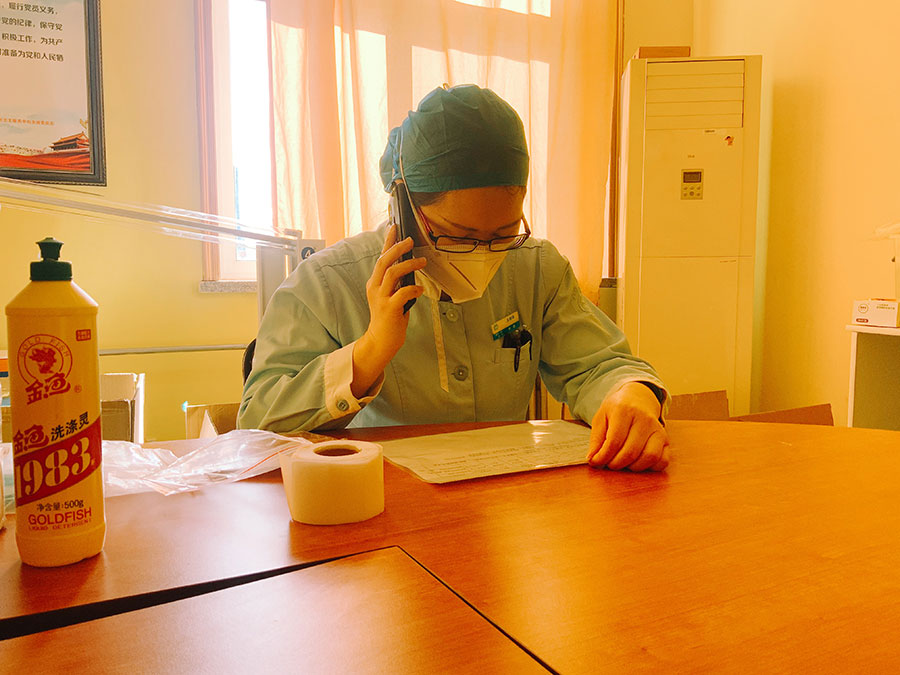
8:00 a.m. Inform the patients of indoor sample collection (People’s Daily Online/Kou Jie)
According to Wang’s work plan, this morning she was expected to visit three families who are in quarantine, offering them throat and anal swabs, as well as collecting samples from their home to determine if they are infected with COVID-19.
“The newly added anal swab is more accurate than nose and throat swabs, albeit awkward for recipients. Most patients in quarantine are required to take such tests, as most of them are people returning from overseas or are close contacts of patients, which means they are among high-risk groups,” said Wang.
In addition to informing the patients of the upcoming tests, Wang also needs to dismiss the patients’ fear of COVID-19, offering them professional advice. A male patient who was expected to take an anal swab expressed his concerns, and Wang spoke softly to reassure him that the method is painless and safe.
“One of the biggest challenges of my work is to communicate with patients. Due to the lack of professional knowledge, some of them may misunderstand or even get angry with us. Some hear rumors from the Internet and refuse to cooperate, it’s our job to make them feel assured and comfortable,” said Wang.
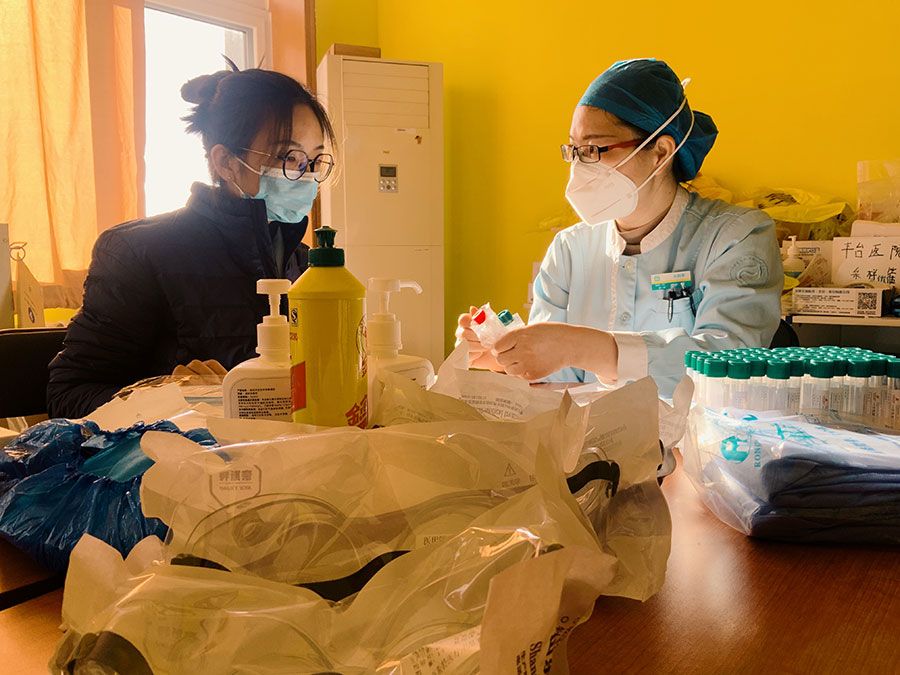
8:20 – 8:50 a.m. Inspection and preparation of equipment (People’s Daily Online/Kou Jie)
Though working as a nurse for over 19 years, tackling the COVID-19 pandemic remains one of the most difficult tasks in Wang’s career. From February to July 2020, Wang volunteered to work in a centralized quarantine center in Beijing, gathering first-hand experience in dealing with the lethal virus.
“There was one time when I worked 40 days in the center without going home. Living and working with COVID-19 patients and possible virus carriers has taught me a lot about the virus, honing my skills in sample collection and nucleic acid testing,” said Wang.
Usually, a COVID-19 test team requires two medical workers. Wang’s partner is 26-year-old Yu Xiaoyi, a doctor who worked in Wang’s hospital for less than a year. Preparing medical equipment together, Wang shared her experience in COVID-19 prevention with Yu, helping young medical professionals better understand the virus.

9:00 – 9:20 a.m. On the way to the first family in quarantine (People’s Daily Online/Kou Jie)
On her way to the first household in quarantine, Wang’s thoughts drifted away to Huanggang, Hubei Province, where her parents live.
Being the epidemic center of China’s first COVID-19 outbreak, Hubei Province is Wang’s hometown. When the COVID-19 pandemic first hit China, Wang was worried about her father who suffered a stroke and her mother who has respiratory issues, but her work in Beijing kept her from going back home. Considering for weeks, Wang the doctor took precedence over Wang the daughter.
“When the pandemic first took place in my hometown, I felt worried and helpless. I really wanted to go home to see my parents, but my duty as a medical professional kept me working day and night in Beijing to tackle the virus,” said Wang.
Weeks after the COVID-19 pandemic hit her hometown, several of Wang’s colleagues were selected to form a medical team to support Hubei’s pandemic control. Though Wang was not in it, she felt grateful for her colleagues’ efforts.
“I thank every medical worker who went to my hometown when my family was in great need. The best way to pay for their effort is to work harder to help more people during the pandemic, and this is what I have been doing,” said Wang.
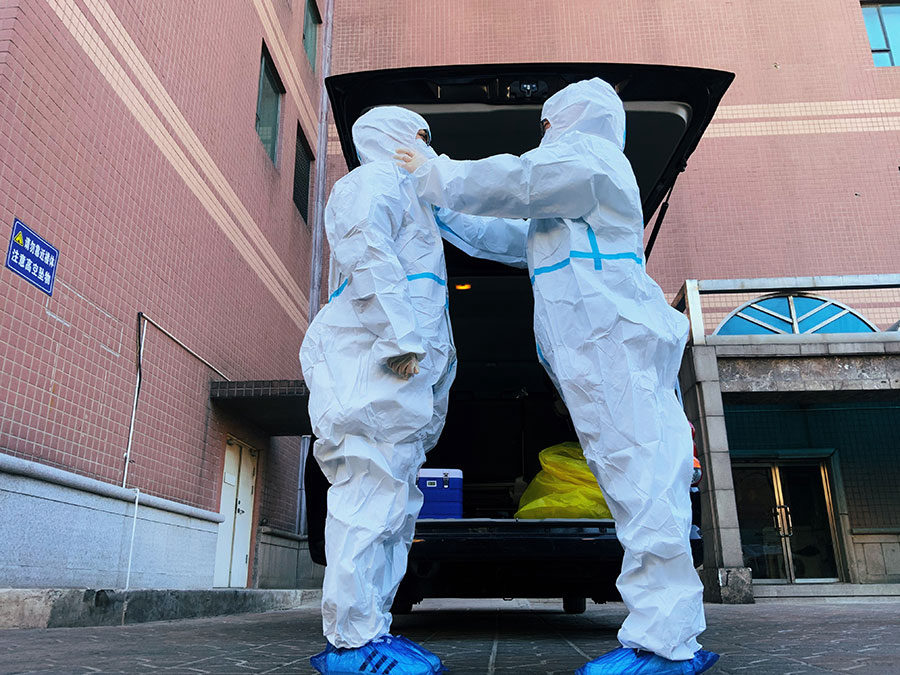
9:25 – 9:35 a.m. Prevention preparation (People’s Daily Online/Kou Jie)
The winter in Beijing is unbearably cold. Working outside in this time was a trial for the spirit and a torment for the body. To tuck themselves in protective clothing, Wang and Yu had to take off their winter clothes, enduring the freezing wind.
When changing protective gears outside the residential building, a little boy riding a toy tricycle came closer to Wang, observing them with curiosity. “You two are angels in white, aren’t you?” asked the boy.
“Yes, we are, kid, aren’t you afraid of us?” asked Wang, refraining herself from laughing.
“Not at all. Well done!” the boy replied.
The boy’s encouraging words made Wang smile. The reason why she became a medical worker is because she loves to see people’s happy faces, while helping patients regain their health is the best reward for her hard work.

9:40 a.m. Enter the house of the first quarantine family (People’s Daily Online/Kou Jie)
The first patient Wang visited this morning was an elderly person, who expressed fear to take an anal swab. Wang spent much time in comforting him, soothing his nerves.
“Most of my patients are elderly, who remind me of my parents. I understand their fear of the lethal virus, and I always try my best to comfort and help them. We are medical workers, but we are also daughters and sons,” said Wang.
“When entering the patient’s houses to take samples, we sometimes encounter hostility and even humiliation. When I was younger, I always cried, but now I try my best to understand the patients’ feelings, relying on my professional skills to reduce the patient’s pain,” said Wang.
Most of the time, Wang and her partner are expected to visit three to seven patients in quarantine in the morning. She must avoid drinking water or eating food before finishing the work, as the heavy workload and the inconvenience of taking on and off the protective gears means that she cannot go to the toilet the whole morning.
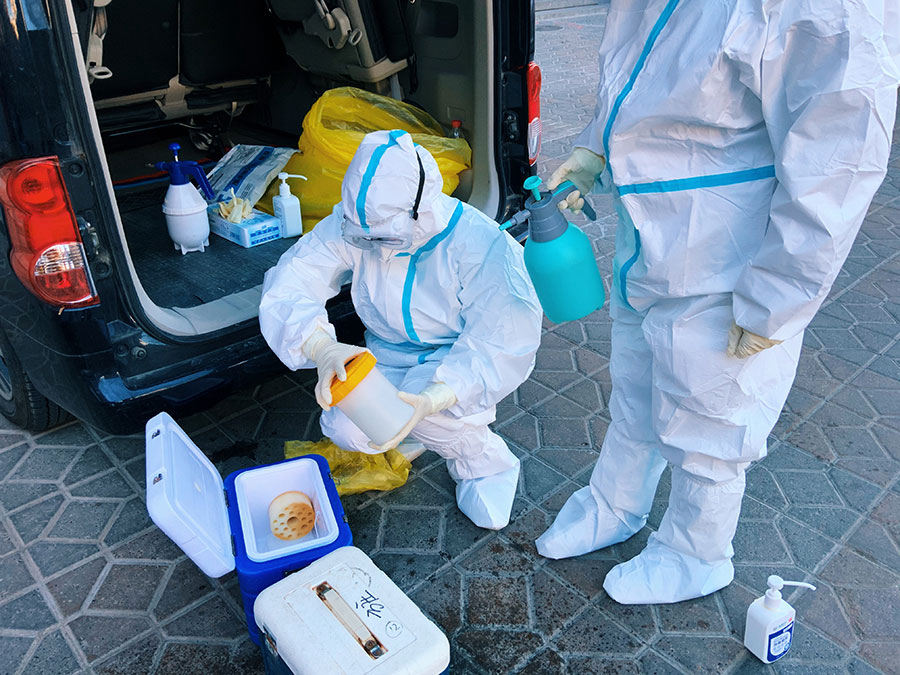
1:00 p.m. Complete sample collection, sterilize samples, take samples back to lab (People’s Daily Online/Kou Jie)
Four hours later, Wang and Yu have completed their morning task. Rigid medical procedure requires them to sterilize the samples on the spot, the disinfectant they sprayed on the sample froze within seconds, leaving grains of ice on their hands.
COVID-19 samples are highly dangerous. Wang and Yu have to go through the sterilizing procedure several times to ensure that the samples are safely dealt with, which may take them another half an hour.
“The coldness outside is unbearable, but at least now we can have an hour of rest and have some decent food,” said Wang.

1:40 p.m. Lunch break (People’s Daily Online/Kou Jie)
Lunch break is Wang’s favorite time of the day. For medical workers like Wang and Yu, the lunch break not only recharges their battery, but can also offer them a chance to temporarily escape from the toil of work.
Today’s topic on Wang and Yu’s lunch table is family. Wang shared fun stories of her 13-year-old son, who is a middle school student.
“My son knows that I don’t have much time to take care of our family, so instead of me taking care of him, he cares about me a lot. When he was a little boy, he already learned how to cook breakfast for me, I feel so proud of him,” Wang told Yu, who added that sometimes she feels that she is in great debt to her son.
“Though being a medical worker is hard and tiring, I always encourage him to consider being a doctor one day. I told him helping people is one of the best life experiences, though I’m not sure if he agrees with me as his mother is always absent,” laughed Wang.

2:20 p.m. Start another round of indoor sample collection (People’s Daily Online/Kou Jie)
After one hour lunch break, Wang and Yu started another round of indoor sample collection.
“I always joked with my patients that they are very lucky, because they can see me more often than my parents do. For instance, by taking samples on the same patient in several weeks, I can see them several times, but it would be a blessing if I can see my parents once a year,” said Wang.
“Some of the patients say they want to have a daughter like me, and I always tell them, ‘no you don’t, because no parent would like to see their daughter working on the frontline to tackle a lethal virus, and no parent would like to see their daughter only once a year,” said Wang.
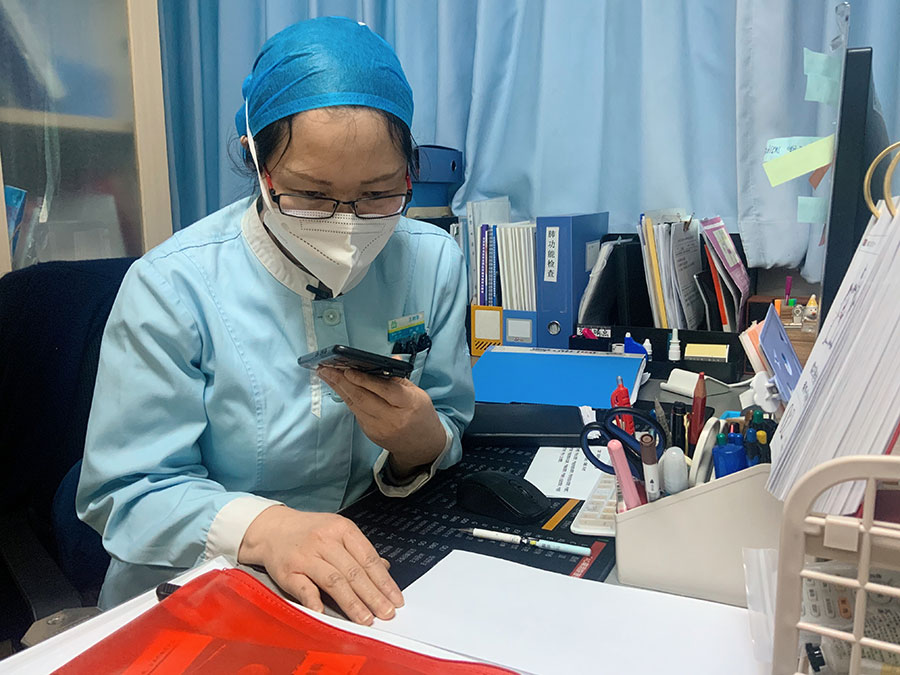
4:50 p.m. Finish afternoon work, call parents (People’s Daily Online/Kou Jie)
After a whole day’s hesitation, Wang decided to make a phone call to her parents, telling them that she is not going home for Spring Festival again.
For the past few years, Wang’s parents showed full support of Wang’s work, but after the pandemic ravaged both Hubei and Beijing, her parents told Wang that they would really love to see her in person during the Spring Festival this year, not through video chat.
“My parents feel that my work is both tiring and dangerous. They want to make sure that the pandemic has not damaged my health,” said Wang. Instead of video chat, Wang decided to call her parents. Due to the heavy workload, she lost 20 kilograms, she feared that her toil-worn face may make her parents more worried.
“Mom, I cannot come home this year, because the pandemic is still here and medical workers are needed,” said Wang.
“Don’t worry my love. Take care of yourself, and I have kept all the food you love. When you are home, I want to have a better look at you,” said Wang’s mother.
“When the cherry flowers are in blossom, I will come home. It is my favorite time of the year, and I believe the pandemic will be under control by then,” said Wang.

5:20 p.m. Additional nucleic acid testing at outdoor testing sites (People’s Daily Online/Kou Jie)
Wang’s working hours usually end at 5:00 p.m., but during the pandemic, additional daily outdoor nucleic acid tests are inevitable. For those who have been to low or medium risk areas, as well as those working in food chain, service industries who contact people more often, Wang’s hospital sets up an outdoor testing site to perform nucleic acid test.
“Outdoor tests usually start from 5:00 or 6:00 p.m.. It can last as long as six hours, depending on how many people are designated to our testing site,” said Wang, who noted that there were many days when she worked until 11:00 p.m.
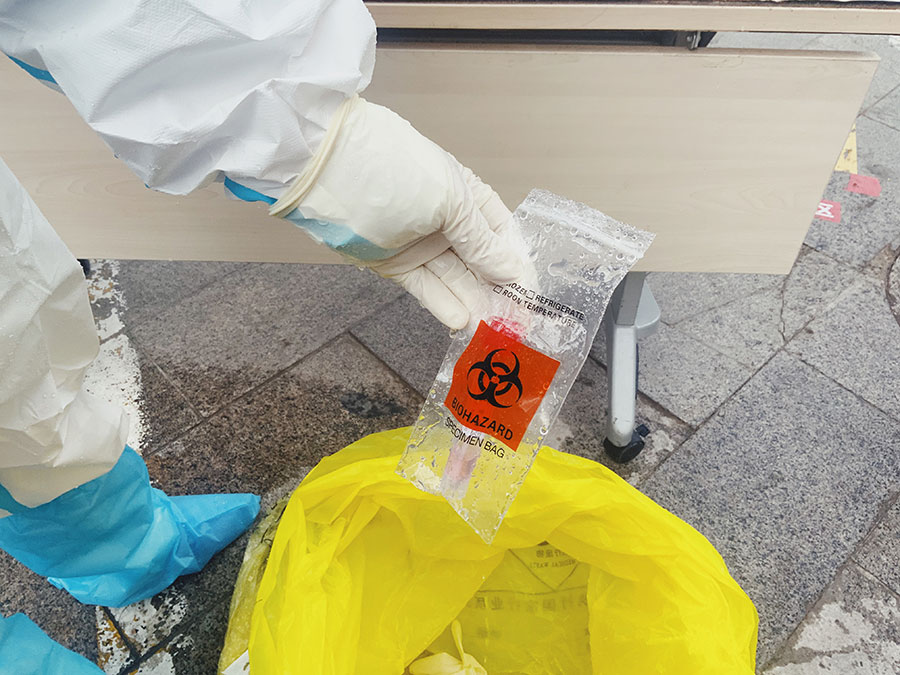
6:20 p.m. Finish outdoor testing work, sterilize samples (People’s Daily Online/Kou Jie)
To Wang’s relief, there were only several patients in the afternoon. At 6:20, Wang and Yu finally finished today’s work. Her hair was soaked in sweat and tangled on her face.
“I’m very lucky today, because usually we cannot finish our work so early,” said Wang.
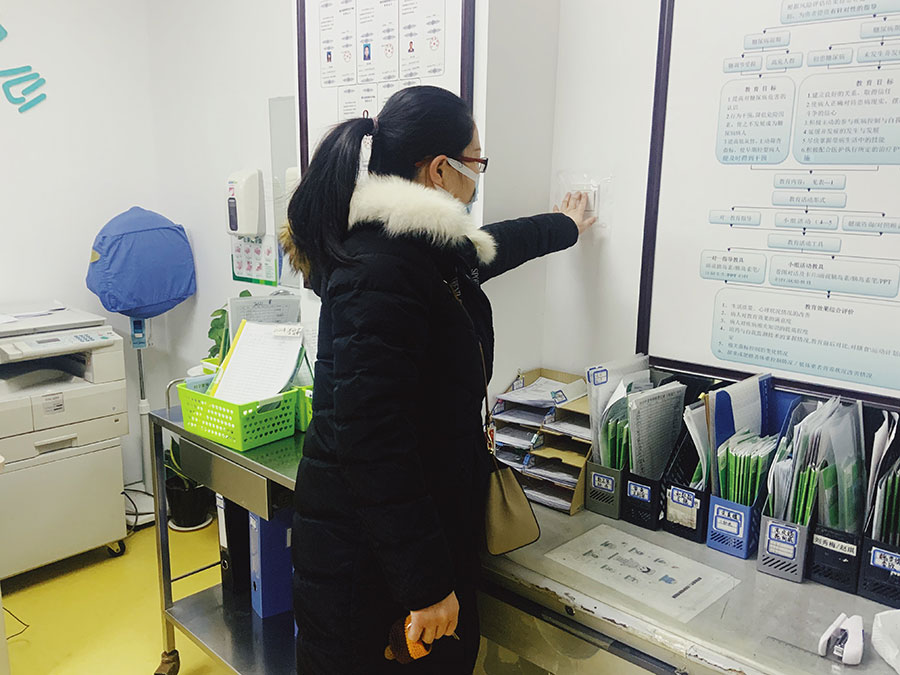
7:00 p.m. Off work (People’s Daily Online/Kou Jie)
After 12 hours of hard work, it is time to go home. Taking off her protective gear, Wang is an elegant woman who loves to follow fashion trends and takes great care of her appearance. Her hair combed up in a pony tail, her hands clutching her favorite handbag, there is no trace of a solemn medical professional on her, but a vibe of simple and unadorned beauty.
The streetlight flickered on and the city went into its evening hustle and bustle, Wang blended in a passing crowd who talked excitedly about the upcoming Spring Festival. No one realized that a warrior, who safeguarded them from the COVID-19 pandemic, was among them.

 Award-winning photos show poverty reduction achievements in NE China's Jilin province
Award-winning photos show poverty reduction achievements in NE China's Jilin province People dance to greet advent of New Year in Ameiqituo Town, Guizhou
People dance to greet advent of New Year in Ameiqituo Town, Guizhou Fire brigade in Shanghai holds group wedding
Fire brigade in Shanghai holds group wedding Tourists enjoy ice sculptures in Datan Town, north China
Tourists enjoy ice sculptures in Datan Town, north China Sunset scenery of Dayan Pagoda in Xi'an
Sunset scenery of Dayan Pagoda in Xi'an Tourists have fun at scenic spot in Nanlong Town, NW China
Tourists have fun at scenic spot in Nanlong Town, NW China Harbin attracts tourists by making best use of ice in winter
Harbin attracts tourists by making best use of ice in winter In pics: FIS Alpine Ski Women's World Cup Slalom
In pics: FIS Alpine Ski Women's World Cup Slalom Black-necked cranes rest at reservoir in Lhunzhub County, Lhasa
Black-necked cranes rest at reservoir in Lhunzhub County, Lhasa China's FAST telescope will be available to foreign scientists in April
China's FAST telescope will be available to foreign scientists in April